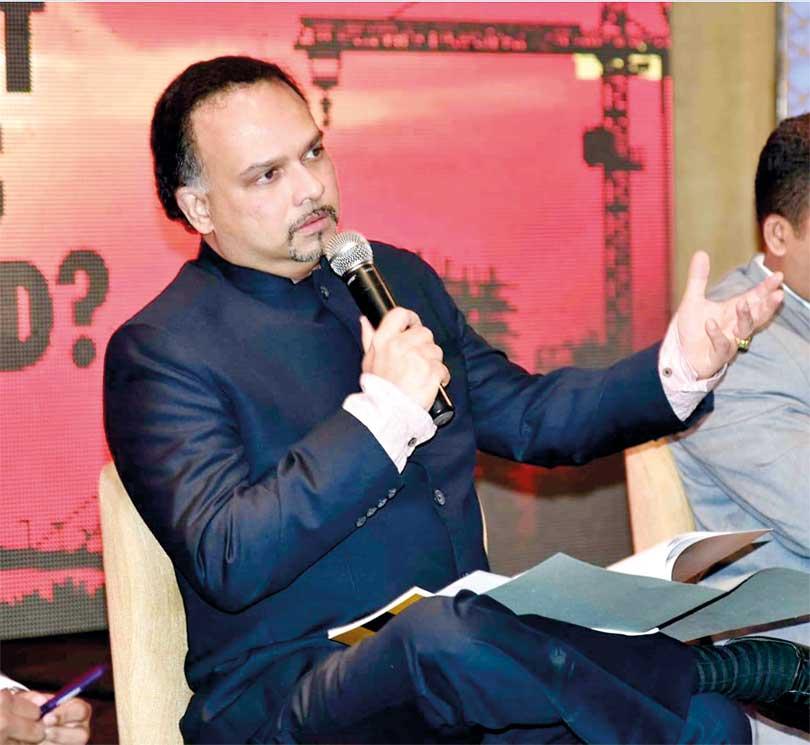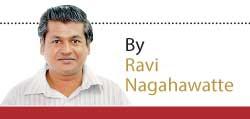Reply To:
Name - Reply Comment

 Greatly inspired by the work of his late father, Gamini, lawmaker Navin has much to look forward to in the field of politics as he gets set to celebrate his 50th birthday on September 9 (Monday).
Greatly inspired by the work of his late father, Gamini, lawmaker Navin has much to look forward to in the field of politics as he gets set to celebrate his 50th birthday on September 9 (Monday).
Fifty years in one’s life is a milestone and calls for reflection. There are those who opine that ‘young’ Navin must set his sight on becoming Sri Lanka’s president one day. But he seems to be in no hurry for that. And there are those who opine that if Navin wishes to be president of Sri Lanka he needs to broaden his vision on politics and become a bit more ambitious. It’s also not a surprise when some who closely follow him air the view that he should shed the laid-back attitude of his.
Navin is an asset to Sri Lankan politics because he represents the pillar that supports democracy, fair play and common decency. The country needs more people’s representatives like Navin in parliament because he also represents the ‘good’ in a world dominated by evil. This is where Navin’s deep roots get highlighted. Both his mother and father were academics and that has greatly influenced him. They often reminded him of the importance of being rooted to a cause; his dad travelled the world but was never uprooted from the Kothmale soil and his mom often reminded him of the importance of being rooted to his school work.
Following his initial education at St. Thomas’ Prep School and Royal College, Navin opted to study law and graduated from the University of Sussex. He was called to the bar in the United Kingdom as a Barrister at Law from the Middle Temple. He also holds a Masters in Finance and Financial Law from the University of London.
Probably due to the social grounding he received from Sri Lankan parents, the young man returned to the island and commenced his political career in 2000 from the UNP ticket in Nuwara Eliya, a seat he has never lost todate.
People judge lawmakers from the preferred angle of patriotism. For most people patriots are those who say they practice Buddhism. Though this mode of judgment is flimsy most of the time, it goes well with the majority of the Sinhala Buddhists in the island. But for Navin, who is also a Buddhist, religion is not the yardstick to judge patriotism. Recently he graced a function organised for young graduates of the National Institute of Plantation Management. Hawkeyed, he quickly spotted an avenue on which he could take the young minds to his preferred destination; liberal thinking. He highlighted the fact that the theme song of the NIPM was composed by a Muslim and asked ‘Is the lyricist not a patriotic Sri Lankan”. He added “Are we to question his patriotism simply based on his ethnic profile”. It’s no wonder why we see this lawmaker stand for decency and democratic values in Parliament.
He was a strength to the Yahapalana regime during the 52-day-illegal government which the president formed with most of the parliamentarians in the opposition. At times when proceedings turned brutal and democracy was threatened, we saw Navin shed his nice guy image and flex his muscles in the face of his adversaries.
Many in Parliament have merely warmed the chairs and continued to enjoy ministerial perks. He is credited with unifying the fractionalised local tea industry and bringing main stakeholders under one umbrella organisation called ‘The Tea Council of Sri Lanka’.
Navin sweated to find a solution to the wage crisis of tea pluckers and even offered to release Rs 600 million from the Tea Board’s kitty to pay an additional rupees 100 a day to estate labourers.
But that initiative never got off the ground because the Treasury backed off from providing the additional Rs 600 million which was needed for this venture. Navin also took the initiative to make tea pluckers receive Rs 40 for every additional kilo of tea leaf plucked each day in the estate sector. The tea pluckers who get Rs 740 credited to their accounts as their daily wage, after deductions are made, see their salary issue remain unresolved because of trade union officials attempting to capitalise on the crisis situation in the estate sector.
Navin also attracted criticism for not halting the use of glyphosate as a weed remover. His argument was that this practice can’t be done away with immediately due to the lack of labour in estates to manually weed out wild plants growing around tea bushes. He encouraged replanting and as result those involved in the small tea sector improved their output by 200%. His ministry claims that Navin is the brainchild behind the proposal for Sri Lanka to exchange tea for the value of petrol that’s imported to the country from Iran.
He must quickly learn that success in Sri Lankan politics also demands a dose of heroism and enough marketing to be thrown into the equation. If he studies the dotted journey of his dad in politics and makes a comparison with his, Navin would see that he is lagging behind
Right now he sees Sajith Premadasa working hard to establish himself as the dark horse who might get to run in the race for presidency. Once when a journalist asked him whether he would like to be the prime minister, his response was that this was not the time for him to take up such a post. He is also not a staunch supporter of UNP Leader Ranil Wickremesinghe and has remained neutral during the crisis within the party which is divided on who should be the presidential candidate representing an alliance led by the Greens. Navin has affirmed that his vision for Sri Lanka is for unity to prevail within the country.
Come Monday when he cuts the birthday cake and feeds his family-wife Dr. Lanka and daughters Samdhee and Mahita-he will surely miss his dad Gamini and mom Srima; who were a popular couple in Sri Lankan politics in the 70s, 80s and up to the early 1990s. Gamini was assassinated when he was 51; at a time when he was reaching his peak of perfection in politics. His mother Srima, after Gamini’s demise, took over the mantle and even contested the presidency in 1994, but lost to Chandrika Kumaratunga. When turning the pages of time, he sees that both his parents were denied the top most accolade in politics; the becoming of president. Navin has the education to finish his political journey on a high. But he must quickly learn that success in Sri Lankan politics also demands a dose of heroism and enough marketing to be thrown into the equation. If he studies the dotted journey of his dad in politics and makes a comparison with his, Navin would see that he is lagging behind. ‘Young’ Navin must learn to market the politics he is doing and make it appealing to the masses.